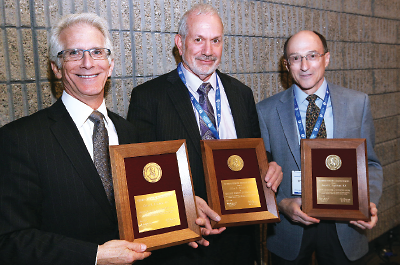Correctional Psychiatry Textbook Wins Manfred Guttmacher Award
Abstract
Correctional psychiatry, a much-needed but greatly underresourced field, gets recognition as the subject of a new textbook.
The 2016 Manfred Guttmacher Award given to the Oxford Textbook of Correctional Psychiatry (Oxford University Press, 2015) at APA’s 2016 Annual Meeting in Atlanta served as a tribute not only for the book but also for the entire field of correctional psychiatry, said its coeditors, Kenneth Appelbaum, M.D., Jeffrey Metzner, M.D., and Robert Trestman, M.D., Ph.D.

From left: Robert Trestman, M.D., Ph.D., Jeffrey Metzner, M.D., and Kenneth Appelbaum, M.D., receive the Manfred Guttmacher Award for their book on correctional psychiatry.
“The award is recognition of this growing subspecialty with its increasing complexity,” said Appelbaum, a clinical professor of psychiatry at the University of Massachusetts Medical School and director of correctional mental health policy and research at Commonwealth Medicine.
APA presents the award annually for “an outstanding contribution to the literature of forensic psychiatry in the form of a book, monograph, paper, or other work published or presented at a professional meeting” over the previous year. It honors the late Manfred Guttmacher, M.D., a forensic psychiatrist and chief medical adviser to the Supreme Bench of Baltimore for 36 years.
This is the first time the award has gone to a work on correctional psychiatry.
Creating the textbook was another step in the development of correctional psychiatry, said Trestman, a professor of medicine, psychiatry, and nursing at the University of Connecticut. He also heads UConn Health Correctional Managed Health Care, which provides all health care in Connecticut’s prisons and jails.
The textbook is intended as a tool for training psychiatry residents and forensic fellows, psychologists, social work interns, and administrators, said Trestman. Such a structured curriculum of study can help guide training, research, patient care, and ethical decision making.
Appelbaum noted that there is now an order of magnitude difference between the number of people with serious mental illness in jails and prisons and those in civilian psychiatric facilities. He praised outgoing APA President Renée Binder, M.D., for recognizing and addressing the overrepresentation of individuals with mental illness in the criminal justice system. In that light, Appelbaum expressed hope that the low number of sessions at APA meetings or articles in APA journals on correctional psychiatry might soon increase, given that many APA members work in the correctional field.
More work needs to be done on expanding the research and evidence base for psychiatric work in corrections, improving opportunities for rehabilitation, and raising standards of mental health care, said Appelbaum.
Too often, clinicians working in prisons must talk with prisoners through the food slots in their cell doors, denying privacy from guards or other prisoners within earshot, he said. “You can’t do psychiatry without confidentiality any more than you can do surgery without sterility.”
Correctional mental health clinicians can work through their professional organizations to raise standards, said Metzner. In 2012, for instance, the APA Board of Trustees approved a position statement saying that a prisoner with serious mental illness should not be held in “prolonged segregation” (solitary confinement).
“If an inmate with serious mental illness is placed in segregation, out-of-cell structured therapeutic activities (i.e., mental health/psychiatric treatment) in appropriate programming space and adequate unstructured out-of-cell time should be permitted,” continued the APA statement.
The National Commission on Correctional Health Care (NCCHC) issued a 17-point position statement in April, saying, among other things, that solitary confinement longer than 15 consecutive days is “cruel, inhuman, and degrading treatment and harmful to an individual’s health. … Juveniles, mentally ill individuals, and pregnant women should be excluded from solitary confinement of any duration.”
Furthermore, said the NCCHC, health care professionals should not be involved in pre-segregation evaluations because doing so condones the use of segregation.
Ironically, prisoners make up the only population group in the United States with a constitutional right to health care and the right to sue the state if it is not provided, said Trestman. “[Yet] we have ignored to the point of absolute intentional indifference the plight of people with mental illness who become incarcerated.” ■



